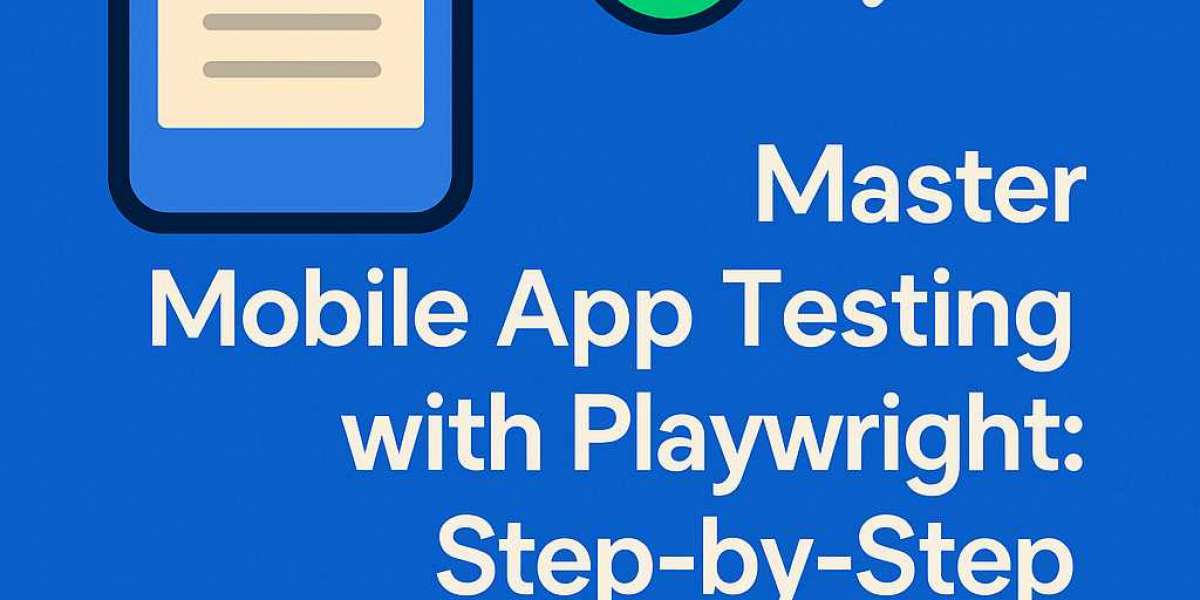In today’s fast-paced digital world, mobile app quality can make or break a user’s experience. Whether you're an aspiring QA engineer or a developer aiming to ensure seamless mobile performance, mastering mobile app testing is a crucial skill. One of the most powerful tools emerging in this space is the Playwright automation tool. While Playwright is traditionally known for web testing, with the right approach, it can also be leveraged for mobile app testing. In this article, we’ll walk through how to get started with mobile app testing using Playwright and how it compares to established tools like Appium testing.
Why Choose Playwright for Mobile App Testing?
The Playwright automation tool is developed by Microsoft and supports multiple browsers and platforms. It's known for its speed, reliability, and ability to handle modern web apps effortlessly. While Playwright doesn’t natively support mobile apps in the way Appium does, it offers the capability to emulate mobile devices and interact with responsive design behaviors. This makes it an excellent tool for hybrid apps or progressive web apps (PWAs), especially those built with frameworks like React Native or Ionic.
For those looking to expand their testing toolkit beyond Appium testing, Playwright offers an intuitive and fast approach to automation with JavaScript, TypeScript, Python, C#, and Java support.
Step-by-Step Guide to Mobile App Testing with Playwright
Step 1: Install Playwright
Begin by installing Playwright in your project environment:
Once installed, you can download browser binaries by running:
Step 2: Emulate a Mobile Device
Playwright allows you to emulate mobile devices using its built-in device descriptors. Here’s an example using iPhone 12 emulation:
This approach is particularly useful for testing the mobile version of responsive web apps or hybrid apps that run in browsers.
Step 3: Automate Test Scenarios
You can write test scripts to verify key functionalities such as login, navigation, or form submission on the mobile layout. For example:
This is similar to how you would write tests in Appium testing, but with less overhead and faster execution in browser-based contexts.
Step 4: Integrate with CI/CD
Playwright can easily be integrated into CI/CD pipelines such as GitHub Actions or Jenkins, ensuring that every app update is automatically tested across mobile and desktop views.
Playwright vs Appium: What to Choose?
While Appium testing remains the go-to solution for native mobile app testing (iOS and Android), Playwright offers a lightweight and efficient alternative for web-based mobile testing. If your mobile app is a PWA or hybrid app, Playwright is more than capable of handling your automation needs.
For native apps, however, Appium still holds the edge with its direct interaction with mobile operating systems.
How to Learn More?
If you’re serious about advancing your QA skills, enrolling in a software testing course in Chennai can be a game-changer. Many institutes now include training in Playwright and Appium, giving you hands-on experience with real-world scenarios. These courses often cover mobile automation frameworks, testing best practices, and even CI/CD integration—making you job-ready in today’s competitive tech industry.
Final Thoughts
Mastering mobile app testing with Playwright can significantly boost your testing efficiency, especially for hybrid and PWA applications. While Appium remains critical for native app testing, the Playwright automation tool offers a modern, fast, and script-friendly way to ensure high-quality user experiences across devices. Pair your learning with a reliable software testing course in Chennai, and you’ll be well on your way to becoming a mobile automation expert.




